11th March 2022 – Shabbat is almost here
And today we will listen to a nigun from Poltava, sung by the Cherkassy born Zalman Bronstein.
Hello, how are you? Unfortunately, the focus is still on Ukraine and there has not been much good news. The exodus of refugees continues and the bombs persist to fall.
In today’s edition we are going to listen to a wordless melody, a nigun, created by a rabbi in Poltava, performed by a rabbi from Cherkassy. Just yesterday, Thursday 10 March, in War Bulletin 31, the President of Ukraine mentioned these two cities and explained that:
“One of the main tasks for us today was organization of humanitarian corridors.
Sumy, Trostyanets, Krasnopillya, Irpin, Bucha, Hostomel, Izyum. Almost 40,000 people have already been evacuated this day. They were given safety at last. In Poltava, Kyiv, Cherkasy, Zaporizhzhia, Dnipro, Lviv.
Humanitarian cargoes were also delivered. Hundreds of tons of food, medicine.
We are doing everything to save our people in the cities that the enemy just wants to destroy. Taking into account the work of humanitarian corridors in the previous two days, we have already evacuated about one hundred thousand people.”
You can find the complete Bulletin here.
In today’s edition we will travel to Poltava and Cherkassy with the music and we’ll learn about the extraordinarily interesting biography of Zalman Bronstein. It is a story of war but also of hope, miracles and resistance. I hope you’ll enjoy it.

Then, please, spread the word.
About Zalman Bronstein
Zalman Bronstein was born in Cherkassy, Ukraine, in 1912. His father, Rabbi Chaim Ezra Bronstein, was sent to Cherkassy from the yeshiva in Lubavitch, to spread the Hassidism.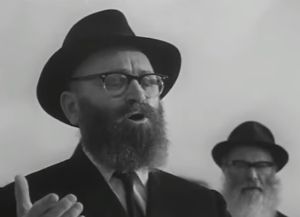
👉 This picture is from ChabadInfo
None of the siblins (Zalman, Michoel, Ettie and Bluma) attented the public school while they were in Cherkassy, even though this was persecuted by the government. Note that in the world after-revolution:
“Judaism was not welcome because it was a religion. There was no place in the new order for yeshivas, which were forbidden. As a result, Soviet Jews could not teach or learn Hebrew in a systematic way. Even the traditional unleavened bread (matzah), essential for celebrating Passover, was sold clandestinely in Soviet times.” From Russia Beyond.
The yeshiva is the Jewish school.
This is the Kreshchatyk Street in Cherkasy circa 1910, with Slovyanskiy Hotel. The picture is of public domain, and I found it here.
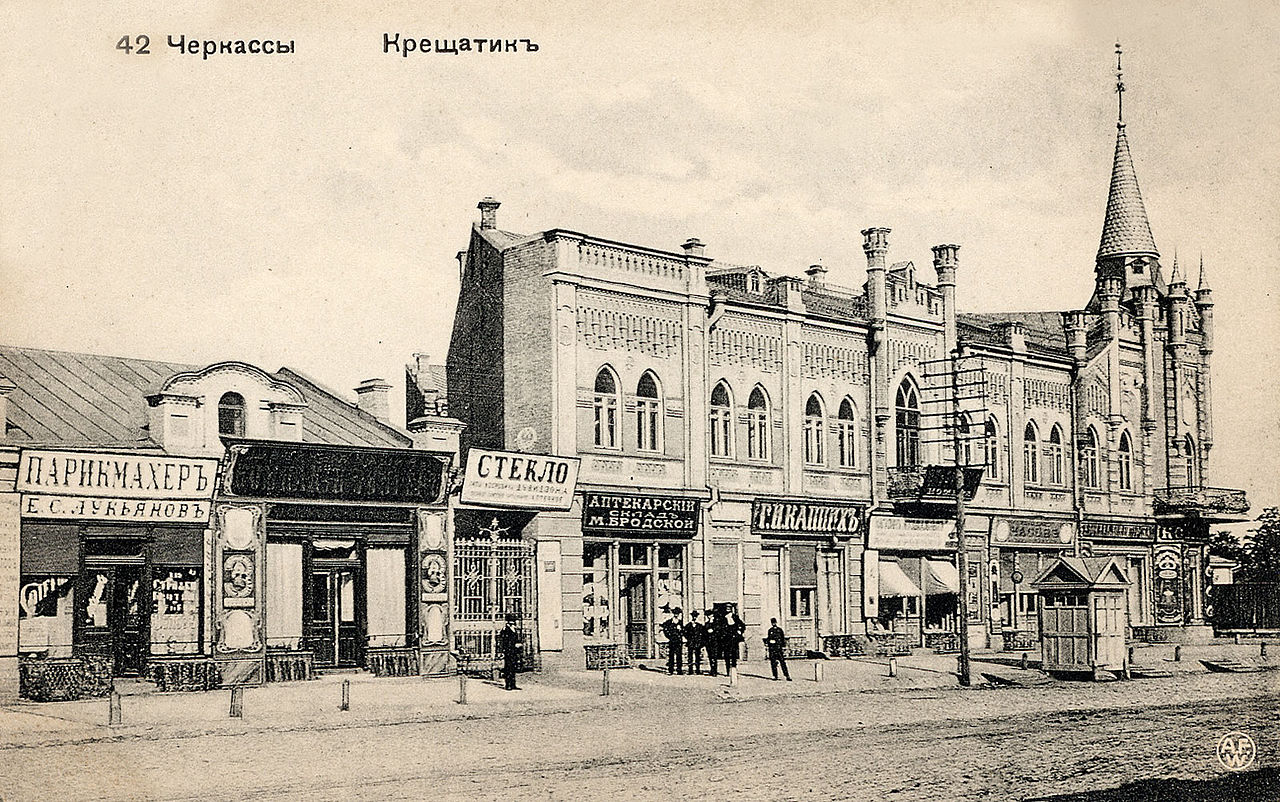
When Zalman was 11, his father took him and Michoel to study in Kremenchug, in an undercover yeshiva. In this interview, Zalman explains that:
“The conditions under which we learned were very bad. When I say “very bad,” I mean intolerable. We learned in a cellar under constant fear. At night we slept in the women’s section of the shul on benches covered with straw filled sacks. There were huge white rats the size of cats, which tormented us, but we couldn’t do anything about it because we were there surreptitiously and there was nobody to complain to. We ate “teg” by Chassidishe balabatim, but the poverty at the time was so great that there were days that we simply didn’t eat.”
– What is teg? Find a recipe here.
– What is “balabatim”? According to the Jewish English Lexicon, plural of balebos, that is the male head of a household.
Afterwards both brothers changed yeshiva on several occasions. Zalman was in Polotzk, Nevel and Vitebsk. The yeshivas were consecutively discovered and forced to close. In the interview, Zalman tells many anecdotes, in which he conveys a great appreciation for his rabbi, R’ Yehuda Eber.
He married a cousin in Moscow and they were living there when World War II began. When the front approached the city, they had to scape and after much wandering, they arrived in Tashkent, Uzbekistan. From there, they moved to the city of Mankent, in Kazakhstan, and in 1942, Zalman’s parents moved there too. There were almost no Jews there.
This Tashkent, with the Kaufman avenue. The picture is of public doman and I found it here.
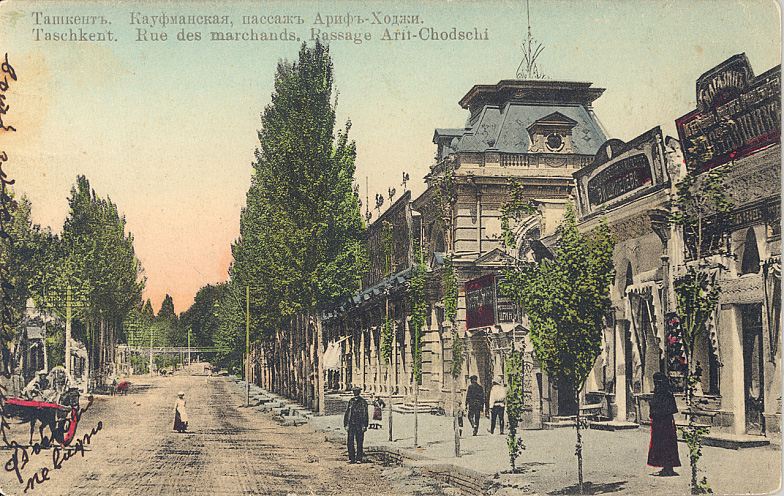
During two or three months, Zalman bribed the draft official, but one day he received an emergency draft notice and he had to serve the Russian army. In the interview he explains that:
“I went to the draft office and tried to bribe one of the doctors, but during the state of emergency a bribe did not help and I was drafted.
The situation at home was terrible. We had no bread and water, there were three little children, and on top of that I was now drafted. […] I had the “privilege” of being drafted and served in the Russian army for four years in difficult battles against the Germans. I have endless stories and wonders in my memory. I saw death before my eyes countless times but something supernatural always happened and my life was saved. […]
It was not easy being a Jew in the army for there was tremendous anti-Semitism. I remember that one of the soldiers once said to me nastily, “When we go on the attack at the front my first bullet won’t be shot against the enemy but at your back.”
But this is Music Before Shabbat – where’s the music? Don’t worry, it’s coming.
I have taken the information for this biography from this page in Chabadaz, where it is explained the anecdote of the bunker and the Kol Nidre in the forest, from Memento from the Wedding of Pessi and Dovie Levy. The 17th of August, 2021, and from this interview in Beismoshiach Magazine.
The discovery of the singer and the saving of his life
From Chabadaz:
“For a year, a bloody war waged between Russian forces and the German enemy. Tens of thousands of young people had already paid with their lives. And there was no end to the fighting in sight.
His shift over, Zalman crept carefully to the bunker. Once inside, he lay down and tried to get some sleep before being sent back to his post.
Unexpectedly, a high ranking officer entered the bunker. He began to shave, all the while singing a song. Zalman opened his eyes. Why had the officer decided to shave in the bunker of the lower ranks, Zalman wondered. However, what bothered him even more was that the officer was singing the song all wrong! Zalman could not resist, and he called out to the officer, ” Comrade Officer, the original song is sung a little differently…”
In the interview in Beismoshiach Magazine this is explained a bit differently:
“He began singing in Russian and I shuddered at his singing off-key. I got up and politely said, “Comrade Officer, you are off-key. And it’s such a nice tune…”
Back to Chabadaz:
“The officer turned to him in surprise. “You know the song? If yes, you must sing it!” Zalman was hardly in the mood to sing. Nor did he have the strength for such pursuits. Try as he might, his excuses were ineffective.
And so, he sang the joyous song as the officer listened with evident pleasure.
When finished, the officer began to grumble about the Russian army. “How can they send a gifted singer to the front lines? It’s wrong, it’s immoral! Today I will bring up the matter at headquarters!”
Zalman was relieved from the front and placed in the choir. A short while after he joined the choir and left his base, his bunker was bombed, and many fellow soldiers died or were badly wounded.
The Kol Nidrei in the forest
The document mention above, Memento from the Wedding of Pessi and Dovie Levy. The 17th of August, 2021, is a fascinating text about the life of Zalman. I wholeheartedly recommend that you take a look at it. It will make you want to read the whole thing. I’m going to bring here just a little piece to tease you. This part is written by Dovid Zaklikowski:
“A concert was scheduled for Yom Kippur, and while the choir prepared for the event, Zalman knew that he would not participate. On the morning of the performance, he informed the musical director that he was unwell and could not perform. The director tried persuading him, but Zalman was adamant that he would not join the troupe.
While the choir sang on stage, Zalman remained in his bunk and prayed as much as he could from memory. As his strength waned toward the end of the fast, someone knocked at the door.
Three high-ranking officers stood in the doorway, and Zalman leaped up to salute them. He feared that he had been caught in a lie. When asked if he was Singer Bronstein, he responded affirmatively.
The three sat on a bed and were quiet for a while, until one asked, “Do you know what today is?” Zalman responded that he did. “We came to you,” the commander continued, “because we are Jewish, and we want to hear a song by which we can remember the holy day as it was in our parents’ synagogues.”
Zalman explained that he had been given sick-leave, and if anyone would hear him singing, he could be punished for his deceit. The officers suggested going into the forest and singing there.
Zalman saw they were emotional, and had no ill intentions, and so he agreed. There, in the forest, he sang Kol Nidrei, Unesaneh Tokef, and as the sun set, he sang the words of Shema and Hu Ha’Elokim, traditionally recited as Yom Kippur ends. These Jews only superficially disconnected from their roots. “I felt the words of prayer entering their hearts,” Zalman said. “Their inner Jewish spark was still alive and revealed.”
Zalman was not yet relieved from the army. He would stay for 4 years. In the meantime, his wife, parents and children moved to Tashkent, where there were more Hasidim. She started working.
As the war intensified, some of the choir members were sent to the front. Zalman was protected by a general, who chose him to be one of three soldiers to accompany him. This probably saved his life, but after the war, the general did not relieve him but offered him a job in Kiev creating a new army choir, in exchange for a house and a salary. He only wanted to return to his family, so he managed to get a telegram sent to him saying that his wife’s health was very serious and that he had to travel to Tashkent immediately.
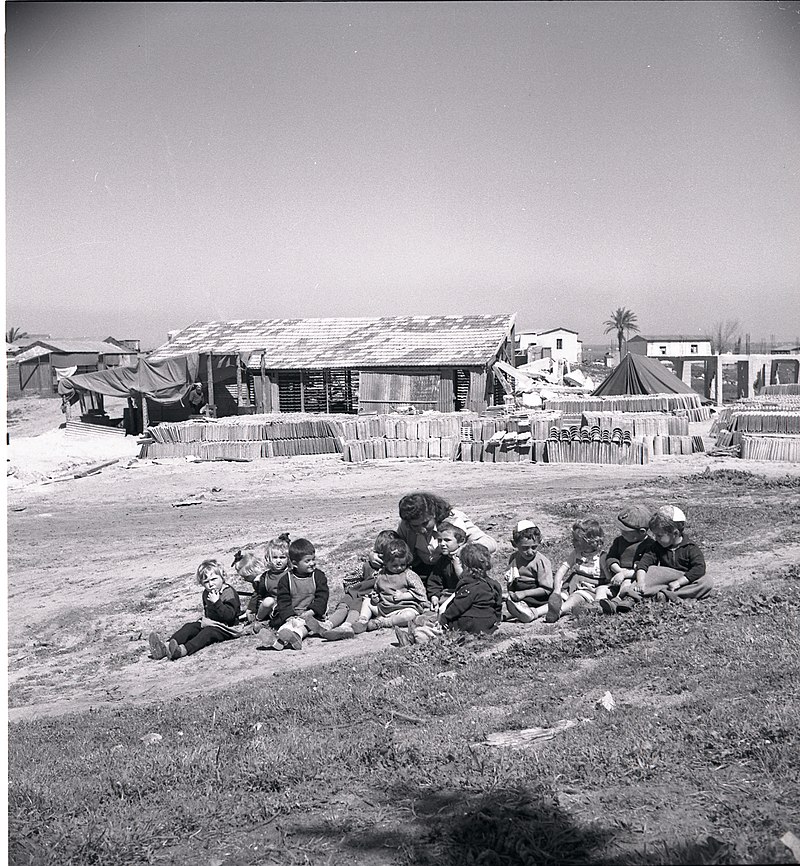 👉 This was Kfar Chabad in 1950 and the picture is from Boris Carmi /Meitar Collection / National Library of Israel / The Pritzker Family National Photography Collection. I found it here.
👉 This was Kfar Chabad in 1950 and the picture is from Boris Carmi /Meitar Collection / National Library of Israel / The Pritzker Family National Photography Collection. I found it here.
After meeting with his family, they managed to organise the departure of several Jewish families from Russia, using false Polish passports. They arrived in Krakow, then Czechoslovakia and then Austria, where they lived in a refugee camp set up by the USA. This was followed by another year in Paris and then Israel in 1947, where they would settle in Kfar Chabad in 1949.
According to the website of Lubavitch.com:
“The Chabad village of Kfar Chabad, located about 5 miles south of Tel Aviv, was established on the 21st of Iyar in 1949. […] In 1946, many Chabad Jews had fled Russia and were living in displaced persons camps in Germany and France. Rabbi Yosef Yitzchak instructed them to migrate to the Holy Land. The 50 or so families who originally settled in what they called the “alteh dorf,” (Yiddish for “old village”) were each allocated a parcel of land on which they built homes and kept farm animals. Collectively, they established communal and religious institutions, including a small synagogue.”
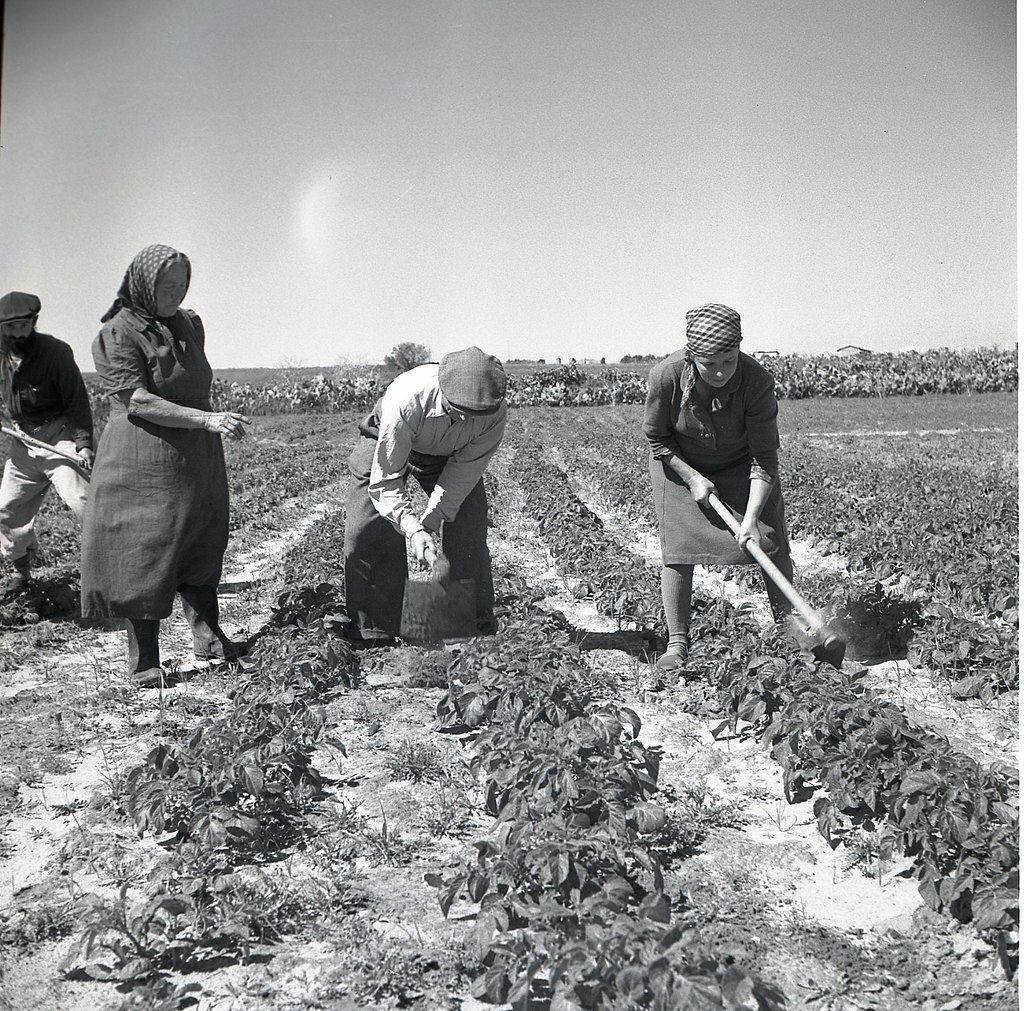 The document Memento explains in deep detail the fights and negotiations to get that piece of land for the Chabad. The first settlers were mostly recent immigrants from the Soviet Union, survivors of the terrors of World War II and Stalinist oppression. The joy of this new beginning was soon marred by the terrorist attack on the synagogue in 1956, which left 6 people dead and several injured.
The document Memento explains in deep detail the fights and negotiations to get that piece of land for the Chabad. The first settlers were mostly recent immigrants from the Soviet Union, survivors of the terrors of World War II and Stalinist oppression. The joy of this new beginning was soon marred by the terrorist attack on the synagogue in 1956, which left 6 people dead and several injured.
👉 This other picture is also Kfar Chabad in 1950 and the picture is from Boris Carmi /Meitar Collection / National Library of Israel / The Pritzker Family National Photography Collection. I found it here.
Today, over 7,000 people live there. Because of the war in Ukraine, an ad hoc crisis centre has been set up in Kfar Chabad to convince Jews to leave the country and to organise help to get them to Israel if they need it.
What about his artistic career?
As for Zalman’s artistic career, it does not seem to have been very formal. On Amazon and other platforms you can find an “album”, but it has no cover, with some amateurish live sound recordings. It seems to be the reference 2646582 of Records DK. But I’m not so sure it’s real as there is no cover as such and on each platform there is a different image, usually taken from a video capture.
About the piece Poltava Nigun
This melody is attributed to Rabbi Yaakov Mordechai Bespalov, Rabbi from the Ukrainian city of Poltava. According to ChabadInfo:
“One of the noble personalities who served as the crown of the Jewish community in Poltava was the Chassid, Rabbi Yaakov Mordechai Bespalov, a distinguished Chabad rav who served as the rav of the city. […] R’ Bespalov was born on 12 Iyar 5615/1855. […] R’ Bespalov led his community with a firm hand and did much to buttress the kashrus of the city. As rav of the city, he faced many challenges and obstacles but with great wisdom and help from Hashem, he overcame them. […] R’ Bespalov always davened with a niggun deveikus replete with emotion that stirred the soul. This niggun later became known as “Niggun Poltava” (some call it “Niggun l’Rav Yaakov Mordechai of Poltava”).”
In the title of the video in this Youtube channel it says it is from 1964 but this seems to be wrong. There is another copy of the video, with the sound in mono, that mentions that “The melody was performed by R. Zalman at the 10th Congress of the International Association of Music Libraries, which took place in Jerusalem in 1974.”
It’s time to enjoy the music:
Click the picture to listen to the Poltava Nigun by Reb Zalman Bronstein:
Shabbat Shalom
Araceli Tzigane | Mapamundi Música
And we share with you one hour of music for joy in this playlist.
To know more about our artists, click here.
May you always find the light in your path.
